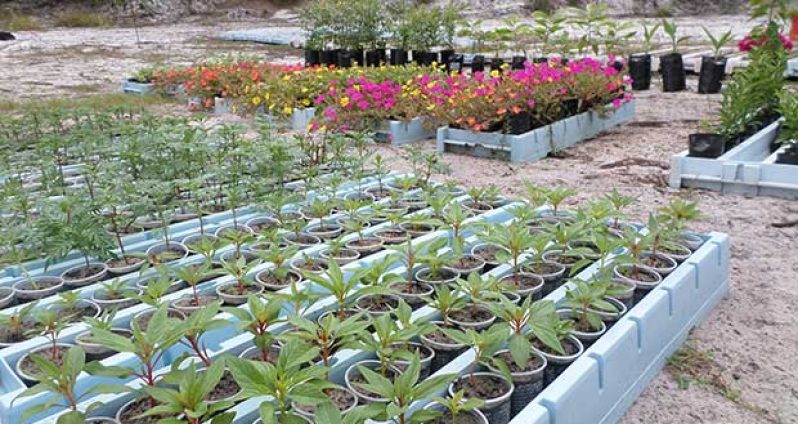–so community can flourish after it’s gone
By Alva Solomon
AS part of its community relations agenda, Australian mining company Troy Resources Limited is working on exploring the entrepreneurial potential of residents of Kaburi.

Located in Region Seven (Cuyuni-Mazaruni), Kaburi is a titled Amerindian Village, the inhabitants of which are primarily descendants of the Akawaio and Patamona nations.
Troy started full production at its operations in neighbouring Kairuni in February this year, and according to Company Executive Director of Project Management, Ken Nilsson, it has discussed several ideas with residents of Kaburi, including the advancement of plant nurseries on a larger scale as well as the introduction of poultry projects.
“They are our neighbours; I would like to see them develop. They have skills that have not been tapped into,” he said of the residents of the community, which is located some 20 to 30 minutes by road from the mining company’s operations.

“They are the real Guyana,” Nilsson said of the villagers, adding that Troy has been giving some thought to what would become of the residents when the time comes for the company to move on from Kairuni.
“The biggest concern for us is (that) we work with a resource that will disappear one day; and when that day comes, these people are to have a future that is one that is going forward,” he said.
BRAZILIAN EXPERIENCE
Nilsson said that Troy Resources experienced similar community relations at its Brazilian operations, in which the residents of two nearby communities were benefiting from the company’s presence. The residents of the smaller of the two, he said, developed their

respective businesses with futuristic plans by investing in small businesses.
The other village, he noted, unfortunately did not take advantage of the opportunities the mining company presented.
“I think we pay quite well,” he said, noting that if one works well, he or she has the opportunity to develop. “We like working with them,” he said of the residents of Kaburi.
Established in 1935, Kaburi boasts a population of some 275 persons from 55 families/households. The main economic activities there are logging, mining, subsistence farming, fishing and hunting.
COMPANY MATTERS
Troy Resources, meanwhile, is currently battling wet weather conditions which are affecting its operations. According to Nilsson, Troy Resources experienced a mechanical problem at its Kairuni site, and this has impacted production.
“It is causing slightly lower production,” he said, but the company is adapting to the situation.
The company employs some 319 persons, 20 to 30 of whom are temporary. Some 34 residents from the locale are employed with the company in various capacities, including exploration works.
Nilsson said there are several Brazilians employed by the company, and those relations stem from the company’s operations in the neighbouring country.
In terms of the specialized portfolios, he noted that there are Guyanese who are functioning well in those positions. These include persons who are employed in the entity’s health and safety department.
“We are an extended family working together,” Nilsson said, adding that the company has been discussing its plans with the University of Guyana in terms of providing support to the tertiary institution.
He said there are two groups of students who are generally supported by the company, while the company is engaged in dialogue with the university regarding scholarship and training.
COMPLIANCE
Meanwhile, Nilsson noted that the company has been following environmental best practices, and he singled out compliance with the regulations as being of importance to the company’s day-to-day operations.
He said the mining company has been visited on many occasions by personnel from the Environmental Protection Agency (EPA) and the Guyana Geology and Mines Commission (GGMC), and that information relevant to its production and staff is always available.
“We comply; it’s as simple as that,” he said. Nilsson added that Troy Resources has been keeping in check with the guidelines of the World Bank regarding environmental best practices.
As regards the global prices, which have affected mining here, Nilsson said, “It affects everybody.” Noting that the price of gold climbed to US$1284 per ounce on Friday, Nilsson said this rise is relative to the uncertainty in the United States’ economy, among other factors.
At the same time, Troy Resources is discussing its drilling mandate as it attempts to upgrade production. Troy Resources is also examining the prospect of investing in other mining operations; and according to Nilsson, the company has seen “some changes here” and is excited about it.
“We are constantly looking for other opportunities,” he said.



.jpg)










